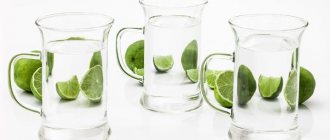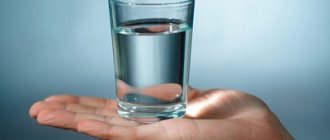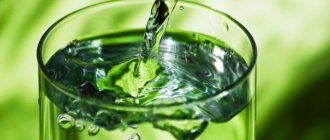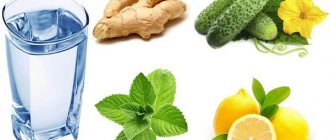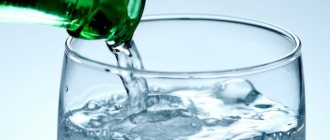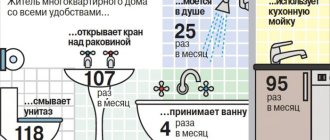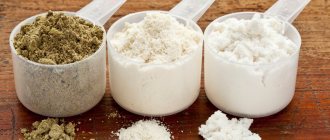The human body consists of 2/3 water, and even with the loss of only 2% of fluid, a person begins to feel extremely thirsty. However, the amount of liquid always depends on age, and the older the individual, the less water, so to speak, in him. For example, in infants the volume of water is 70-75% of body weight, in people under 50 years old - 60-65%, and in elderly people - 50-55%. By the way, according to experts, it is the deteriorating ability of body tissues to bind and retain water that is one of the main causes of aging. And it’s not for nothing that we are all taught from childhood to drink as much water as possible.
But drinking at random and drinking wisely are two different things, and it all depends on the details. Let's not talk about extraneous topics, but let's get straight to the main thing.
In lesson four we will cover the following questions:
- How much water should you drink per day?
- What are the consequences of decreasing or increasing the amount of water you drink?
- When to limit the amount of water you drink
- What exactly should you drink?
- Water substitutes
- How to drink correctly
- Daily drinking regimen
- Drinking regime for women
- Drinking regimen for hypertension and high cholesterol
- Drinking regime for active people
And we will begin with one of the most vital and practical issues.
How much water should you drink per day?
Despite the fact that hundreds of studies have been conducted on the topic of daily water intake, there is not yet one specific opinion. Some recommend drinking at least 2 liters of water per day, while others advise measuring the volume in glasses and drinking at least 8 glasses. There are also those who make calculations based on the proportions of 30 ml of water per 1 kg of weight. But, one way or another, no matter what option is adopted, the result is approximately 2-2.5 liters.
Here it should be pointed out that there is also a rather original opinion: you should drink as much water as you want, and there is no point in forcibly pouring liquid into yourself. Moreover, the lion's share of the necessary life-giving moisture enters the body along with food: tea, compotes, soups, etc., which fully satisfies the body's needs for water. We will not opt for any particular option, but use a little of everything.
When calculating the daily volume of water, you need to be guided not only by the recommended volumes, but also by the following factors:
- If a person is sick and/or takes medications, you need to drink more to remove toxins
- In the summer, you also need to drink more (not 30, but 40 ml per 1 kg of weight), because water is involved in the process of cooling the body
- Those engaged in active physical work and athletes need more water (50-60 ml per 1 kg of weight)
- Children need more water because... they are more active, which means the body uses more water
It would not be superfluous to note a few more situations when water intake should be increased:
- Smoking. Cigarette smoke “dries out” the mucous membranes of the throat and nose, as a result of which a person’s local immunity weakens. This increases the likelihood of contracting airborne diseases. In order for the hydration of the mucous membranes to be normal, smokers need to drink 60% more water per day than non-smokers.
- ARVI. During the process of illness, the body loses more moisture than usual, because... it comes out with sweat. In addition, water is involved in the formation of mucus with immune system cells that kill viruses. In case of ARVI, the volume of water should be increased by 50%.
- Lactation. Breast milk requires large amounts of water to form. Any nursing woman should increase the amount of water consumed per day by 50% if there is a lot of milk, and by 150% if there is little milk.
- Protein diet. Any diet for weight loss involves a lot of protein. If there is not enough water in the body, constipation may occur. Also, in the process of breakdown of fatty tissue, the number of toxins that must be eliminated from the body increases. With a protein diet, fluid intake should be increased by 30-50%.
- Heavy loads. People who play sports, lead an active lifestyle, and visit baths and saunas should increase their daily water intake by 30-100%.
- Sex. After sex, the body becomes dehydrated in much the same way as during fitness, so it is recommended to drink 1-2 additional glasses of water.
But “experiments” with the amount of water also have their own nuances. They do not cause serious harm (except in cases of acute water shortage), but they definitely need to be mentioned.
What are the consequences of decreasing or increasing the amount of water you drink?
It is impossible to cause any critical damage by increasing the amount of liquid you drink. Firstly, the kidneys can pass up to 20 liters of water per day, and they simply “will not notice” 1-2 extra liters. And secondly, excess fluid will be removed along with natural secretions.
But a lack of water will be reflected almost instantly:
- Water deficiency of 1-2%: extreme thirst
- Water deficiency of 2-3%: disruption of digestive processes, anxiety, loss of performance
- Water deficiency by 4-5%: dizziness, headache, nausea, drowsiness, mood swings
- Water deficiency by 6-9%: impaired coordination of movements, impaired speech coherence
- Water deficiency of 10%: disruption of thermoregulation and cell death
- Water deficiency by 11-12%: disruption of biochemical processes
- Water deficiency more than 12%: worsening condition
- Water shortage of 20%: lethal
These facts have been established by scientists and confirmed by multiple studies. And they say that a person is simply obliged to monitor the flow of fluid into his body in proper quantities, and in no case allow a lack of water. Although, there are situations when limiting the amount of liquid you drink is not only possible, but also necessary.
Main conclusions
Drinking regime is the basis of proper nutrition, weight loss and a healthy lifestyle. Without enough moisture, it is difficult for the body to function, and all the usual internal processes can slow down. The main effect of water on the human body:
- regulates the overall temperature inside the body;
- promotes the absorption of nutrients from food;
- regulates the course of all metabolic processes;
- responsible for removing waste products.
When losing weight, it is worth providing the body with an increased amount of fluid. The drinking regime will help the process of losing weight and cleansing the body, getting rid of swelling and external signs of cellulite.
Do you adhere to the daily water norm? Share your impressions about the drinking regime and the nuances of observing it in the comments!
When to limit the amount of water you drink
As a rule, cases when it is necessary to reduce the amount of water consumed are associated with certain diseases. There are a few of them:
- Phosphaturia, renal failure and other kidney diseases. The mechanism for removing fluid from the body is disrupted, and its excess can cause vascular overload.
- Hypertension. Drinking large quantities of water at once can cause a surge in blood pressure (despite this, you need to drink a lot to thin the blood and reduce pressure). By the way, hypertensive patients are advised to limit their consumption of table salt and eat more fruits and vegetables.
- Swelling of the limbs. Here everything should be decided individually in consultation with a specialist. If edema is caused by diseases of the endocrine system, kidneys and heart, the drinking regime must definitely be adjusted, and if the edema is exclusively physiological in nature, then reducing the amount of fluid drunk can aggravate the disease.
Be that as it may, the body of each individual person is unique, and therefore, in any case, it is necessary to contact doctors who can help determine the causes of a particular disease and develop a special drinking regimen.
But apart from the health problems listed above, drinking large amounts of water has only benefits. A lot of harmful substances enter the human body along with food, drinks and air, as a result of which the body becomes polluted, and this in turn becomes the cause of various diseases. Water, if it does not contain impurities, cleanses the body of toxins, waste and other debris, and we can safely say that water-drinkers do not cause any damage to themselves.
We also note that, firstly, plain water has no calories, secondly, if you drink it before meals, a person will eat less food, which is also very useful and prevents overeating, and thirdly, metabolic processes and fat burning thanks to water will go much faster. So 2.5-3 liters of water per day is very good.
Benefits and harms
Warm drink is considered a universal cleanser for the body, which is actively used in Eastern medicine (for example, in China).
Among the advantages of this approach to weight loss it is worth noting:
- improvement of skin condition;
- normalization of the gastrointestinal tract;
- no need to suddenly change your diet or fast.
Losing weight with boiling water does not involve introducing intense physical activity into your daily routine.
This method will be a godsend for those who, for some reason, cannot play sports.
The disadvantages of the boiling water diet will be the same as with all other methods of losing excess weight:
- a person's muscle mass decreases;
- the load on the urinary system increases;
- Eating disorders may appear;
- If you abruptly leave the diet, weight can quickly increase.
We recommend an article on the topic
Health question: is drinking hot water healthy?
Losing body weight in hot water can lead to exacerbation of chronic diseases. Therefore, if a person has health problems, you should first talk to a doctor.
What exactly should you drink?
What is considered the best drink is another important question that needs to be considered. Naturally, the best option will always be clean water without gas. But, for example, the famous nutritionist and endocrinologist Natalya Fadeeva says that it is quite possible to drink bottled low-mineralized (up to 50 ml/l) water, because it is considered an excellent solvent. But water with a mineralization of 500 mg/l can be drunk only in limited quantities and with the permission of a doctor, because it's healing.
Approximately 1/3 of the daily water volume can be replenished with herbal teas and well-diluted vegetable juices. If a person is prone to profuse sweating, you need to add some greens or fresh berries to the water - they will help replenish the lack of microelements lost with sweat.
But coffee, milk, alcohol, carbonated drinks and juices cannot be considered drinks. Alcohol and coffee generally remove water from the body and increase dehydration (dehydration). To replenish lost fluid, a person should drink the same amount of water as they drink coffee and alcohol. As for sweet drinks and milk, the former sharply increase blood sugar, and the latter also adds extra calories.
The exceptional usefulness of water and the very small number of its substitutes are obvious facts, and it is best to opt for ordinary drinking water. But today you can increasingly find “unusual” water. The answer to the question: is it worth drinking it, you will find out in the next section.
Is drinking important to lose weight?
Drinking is especially necessary for a losing weight .
When losing weight, the body experiences a certain amount of stress. Water helps maintain performance. Moisture saturates cells with nutrients, due to which a person remains alert. Water allows digestion to remain at an acceptable level. Drinking helps reduce appetite and reduce hunger.
When losing weight, water, along with the blood, delivers essential minerals and vitamins to the organs, which a person is deficient in.
In the process of losing weight, water allows you to quickly remove toxins from the body. Water load allows the kidneys to work better.
Water substitutes
“Fancy” water refers to oxygenated, coconut and structured water. What is it, and what is the “trick” of each type?
Oxygenated water
Oxygenated or, more simply put, water enriched with oxygen is distinguished by the fact that it transfers oxygen to the body’s cells much faster, which is why a person does not feel overworked for a long time, and fatigue goes away faster. The high oxygen content has a beneficial effect on brain function, recovery processes and the removal of toxic substances from the body.
Nutrition specialist and medical psychologist Elena Morozova says that oxygenated water is recommended for use by athletes, people leading an active lifestyle or engaged in heavy physical work, living in unfavorable environmental conditions, and regularly experiencing stress. Such water increases people's efficiency with less physical activity and helps them return to normal faster.
But the most beneficial is water that is enriched with naturally occurring oxygen obtained from mountain springs. Many companies use medical oxygen in the production of oxygenated water, pointing out its uniqueness and naturalness, but the content of useful oxygen in such water is extremely low, and already half an hour after opening the container there is practically nothing left of oxygen in the water.
Coconut water
Coconut water is a drink and a meal at the same time. It contains proteins and carbohydrates in some quantities, but most of all it contains microelements and vitamins. Coconut water has the same level of electrolytes as human blood plasma, which is why it is often called the “juice of life.”
Elena Morozova, mentioned above, claims that coconut water perfectly restores water balance and is an excellent drink in the heat. It is also suitable for athletes, especially good after tiring activities. But you need to keep in mind that when interacting with oxygen, it very quickly loses its nutritional and beneficial properties. You need to drink it immediately after opening the bottle (or coconut), and there is no point in leaving it in the refrigerator.
Structured water
It has been scientifically proven that water found in inanimate nature differs in its structure from water in living organisms. When water enters the human body, it is rearranged, which requires a lot of energy. To minimize energy costs, researchers have developed different options for structuring water.
Structured water, as soon as it appears in the body, is immediately included in metabolic activity, and, according to many doctors, has a very good effect on health. But let us cite the opinion of Elena Morozova: she points out that the effectiveness of this type of water has not yet been confirmed. Of course, experiments are being conducted, but no official data has yet been released to the general public.
It is also important that scientists argue about the length of time that structured water retains its structure after exposure to the body. Some physiologists believe that this period is not too long, and can range from several minutes to half an hour.
Thus, we found out that the best option for drinking is regular drinking, oxygenated and coconut water (we won’t say anything unequivocal about structured water). So take note of this and drink some water. But you also need to drink not anyhow, but correctly.
We tell you how to drink.
How to drink correctly
Any nutritionist will tell you that you need to drink water in small portions throughout the day. Nutritionist Natalya Grigorieva says that some people, remembering that they didn’t drink enough water, drink the daily amount at one time, especially often before bed. The result is bags under the eyes and a swollen face in the morning.
The best option would be to put a bottle of drinking water somewhere in a visible place so that you don’t forget to drink, and, in fact, drink a few sips from time to time. It is important not to forget to track the approximate amount of water you drink.
It is very useful to start the day with a glass of clean water. You should drink it half an hour before meals to get the digestive system up and running. By the way, it is recommended to drink a glass of water not only in the morning half an hour before breakfast, but generally 30 minutes before each meal. After eating (after 30-40 minutes), you should drink a glass of herbal tea to replenish your fluid supply. The last glass of water or tea should be drunk half an hour before bedtime.
There is no consensus on taking water during meals, but most nutritionists believe that this can be done in moderate doses. According to Elena Grigorieva, a large amount of liquid will lead to indigestion, but, for example, half a glass will simply compensate for the lack of saliva. While eating, you need to drink in small sips, and the entire available amount of water (half a glass) needs to be spread over the entire meal.
Now it’s time to move directly to the drinking regime, and first we will talk about the everyday drinking regime, i.e. about the drinking regime for all people.
Losing weight with water
People who cannot maintain any diet eventually wonder if and how it is possible to lose weight with water? Nutritionists give an affirmative answer to this: it is possible if you follow a certain drinking regime. Various water procedures also help you lose weight: swimming, contrast showers, douches and all kinds of hydromassages. To achieve better results, do them all together.
Water diet
Try the water diet and feel its effect for yourself. Basic rules for losing weight this way:
- Drink a glass of H2O every morning on an empty stomach in small sips over a few minutes to kick-start your metabolism.
- Do the same before every meal. This will keep you full and eat less.
- Do not drink within an hour after eating - liquid will interfere with gastric juices to digest food.
- Drink water at room temperature, because cold water can cause hunger.
- The diet does not provide for dietary restrictions, but to lose weight faster, give up junk food and sweets.
- Arrange fasting days on the water once a week.
- Choose only clean, still water.
- Do not go on such a diet if you have chronic kidney or urinary tract diseases, consult your doctor.
- The drinking regime must not be violated.
Water treatments
It is worth noting that water procedures are considered very effective. They do not promote the breakdown of fats, but provide an excellent massage. At home you can douse yourself and take a contrast shower. Such manipulations perfectly wake you up and tone you in the morning, strengthen you, increase muscle tone, and tighten your skin.
In sanatoriums, the choice of such procedures is somewhat wider. There you can take a course of dousing with water with different mineral compositions, which improve the condition of the dermis, reduce the appearance of cellulite, and help speed up metabolism. A Charcot shower or high-pressure water massage provides a lymphatic drainage effect, stimulates the removal of excess fluid, resulting in a reduction in body volume.
An excellent result is obtained by underwater massage with water pressure, which effectively breaks up the orange peel no worse than anti-cellulite procedures performed manually by a specialist. This effect helps to lose weight, improves blood circulation, and prevents varicose veins. Each of these procedures must be completed in a course of 10-15 visits.
Swimming
Swimming helps you actively lose weight, and it doesn’t matter where it happens - in a pool or open water. Even simple movements in water help burn 400-500 kcal per hour . During swimming, blood circulation improves, breathing quickens, and the functioning of all internal organs and muscles is stimulated. Cool moisture cools the body, thereby starting the process of heating the body's temperature. As a result, calories are burned even more efficiently.
Daily drinking regimen
So, different professionals offer different modes, but the most common is the following:
- Drink a glass of water half an hour before each meal
- Drink a glass of water an hour after each meal
- Drink half or a whole glass throughout the day, regardless of meals
Research is regularly conducted on the effectiveness of drinking regimes, and one of the most recent was conducted at Harvard University. The results showed that the above regime is quite suitable for any person.
Let us remind you that:
- The bulk of water is excreted from the body in the form of urine through the kidneys (about 1.5 l/day)
- Some of the water leaves the body with sweat (about 300-600 ml/day)
- The proportion of water exhaled through the lungs (about 400 ml/day)
- A little water comes out through the gastrointestinal tract (about 200 ml/day)
Hence the conclusion follows that in order to fully replace lost life-giving moisture, a person needs to drink at least 2-2.5 liters of water per day. But if you suddenly can’t handle 2.5 liters, you shouldn’t worry, because... water comes with food and is even formed inside the body itself (approximately 300-400 ml). So it’s quite possible to limit yourself to 1.5 liters of water per day, drink tea, eat soups, fruits and vegetables, and everything will be fine.
But, despite the fact that the above regime is suitable for everyone, women who are especially sensitive to the elasticity of their skin and care about prolonging their youth can be advised to have a slightly different option.
What kind of water helps you lose weight?
H2O helps you lose weight by participating in the breakdown of fats, removing toxins, and accelerating metabolism. You can also prepare drinks with it, which also promote weight loss, having a beneficial effect on metabolic processes. For example, add lemon, ginger and other ingredients to water, which increase the fat-burning properties of the liquid several times.
Mineral without gas
Before purchasing such a product, be sure to study its composition. If you want to lose weight, mineral water containing chlorine ions, magnesium sulfate, and sodium is suitable for you. It promotes gentle cleansing of the intestines and blocks the absorption of certain substances and fat. Sodium sulfate and magnesium sulfate mineral water is best suited for this. You should drink no more than 600 ml per day.
Melted
The benefit of melt water lies in the absence of various additives and impurities, which significantly improves its quality. The sizes of its molecules are much smaller compared to ordinary H2O, due to this it is absorbed by cells much faster. Thawed liquid reduces cholesterol in the blood, has a positive effect on heart function, and accelerates metabolic processes.
Sassi with lemon
This drink has a diuretic, fat-burning, thirst-quenching effect. To prepare Sassi water, you need to chop 1 lemon, 1 cucumber, 10 mint leaves, 1 small ginger root, put all the ingredients in a jar, pour two liters of cold H2O and put in the refrigerator. The next day the drink is ready to drink. You can drink this water 1-2 times a week to improve your health, or for 3-4 days, excluding harmful foods. By drinking the drink according to the second option, you will lose 3 kg in four days.
Drinking regime for women
This regimen was developed by the US Academy of Anti-Aging Medicine and is as follows:
- 1-2 glasses of “living” water (that is, not tap water, but natural water; you can use filters for drinking water) in the morning immediately after waking up
- 1-1.5 liters of water throughout the day, no matter what
- 1 glass of water 30 minutes before each meal
- 1 glass of water during (even small sips) or 40 minutes after meals
- 0.5-1 glass of water or herbal tea every 2-3 hours
- 1 glass of water 30 minutes before going to bed
And one more piece of practical advice (for both women and men): thirst is a sure sign that the body is becoming dehydrated. It usually appears when the body loses 1-2% of the total amount of fluid, which is approximately 3-4 glasses. So, when you are thirsty, you should definitely replenish water, and under no circumstances resist the desire to drink.
Drinking regimen for hypertension and high cholesterol
Drinking water is already an excellent way to combat hypertension. But for greater efficiency, we can recommend the following scheme:
- 1 glass of mineral water in the morning on an empty stomach
- 1 glass of mineral water 15-20 minutes before each meal
- Do not drink 30-40 minutes after eating
- 1 glass of mineral water before going to bed
The drinking regimen for high cholesterol is approximately the same, but there is one additional condition: to unload the urinary and cardiovascular systems, you need to supplement the above regimen with 1.5 liters of drinking water per day. But for any illness, you should always consult your doctor about your drinking regime.
And, of course, we could not ignore people who play sports, lead an active lifestyle or undergo serious physical activity.
Contraindications to the use of the technique
Although the boiling water diet is a gentle way to detoxify and lose weight, there are people who should not use this approach.
These include, first of all, those who suffer from certain chronic diseases:
- serious metabolic disorders (including diabetes);
- problems with the kidneys and urinary system;
- bronchial asthma;
- acute infectious diseases;
- cardiovascular problems.
Also, losing weight on a water diet is not recommended for women during pregnancy and lactation and in the presence of mental disorders (chronic stress, panic attacks, depression, and so on).
Drinking regime for active people
The presented drinking algorithm was developed by the American College of Sports Medicine. Its essence is this:
- 1-2 hours before training (or other physical activity), be sure to drink 400-600 ml of water, herbal or fruit tea
- During training (or other physical activity), drink 3-5 small sips of water every 15 minutes.
- At the end of a workout (or other physical activity), you need to drink an amount of water equal to the weight lost (if it is impossible to find out the lost weight, you should drink 0.5-1 liters of water)
And finally, a few more tips for those for whom the correct balance of water in the body is important.
Additional recommendations
It’s likely that the information below is already familiar to you, but it’s still worth giving a couple of useful recommendations:
- If you don’t feel thirsty during the day, you don’t need to forcefully drink a lot of water - it’s much healthier to take just a few sips for prevention.
- It is advisable for women to drink 1 liter of water more than men, because... their genitourinary system needs more thorough rinsing
- Drinking 5 or more glasses of water increases your chances of avoiding stroke by 41% and kidney and bladder stones by 23%.
- If you instill in your child the habit of drinking 8 or more glasses of water a day, his academic success will be much better
- People who drink 1.5-2 liters of water every day are 45% less likely to have gastrointestinal cancer and 50% less likely to have bladder cancer.
- For overweight people who feel hungry, it is better to drink a glass of water first, because... behind the feeling of hunger there may be a feeling of thirst
Water is one of the most wonderful means for maintaining health, vitality and good mood. Therefore, drink as much as possible, and try not to replace water with juices, sodas, coffee, milk and other drinks. If the question is: how to quench your thirst, the answer should always be the same - drink a glass or two of water (by the way, read this article about the benefits of water). We finish the lesson and continue the course.
The fifth and final lesson will introduce you to several nutritional regimens and diets, including the protein and Japanese diets, the Malysheva diet, the Dukan diet, a raw food diet and several others. After studying the fifth lesson, it will become much easier for you to organize a proper diet.
Test your knowledge
If you want to test your knowledge on the topic of this lesson, you can take a short test consisting of several questions. For each question, only 1 option can be correct. After you select one of the options, the system automatically moves on to the next question. The points you receive are affected by the correctness of your answers and the time spent on completion. Please note that the questions are different each time and the options are mixed.
Statistics Full screen
Kirill Nogales
← Vitamins and microelements Nutrition and diet →

